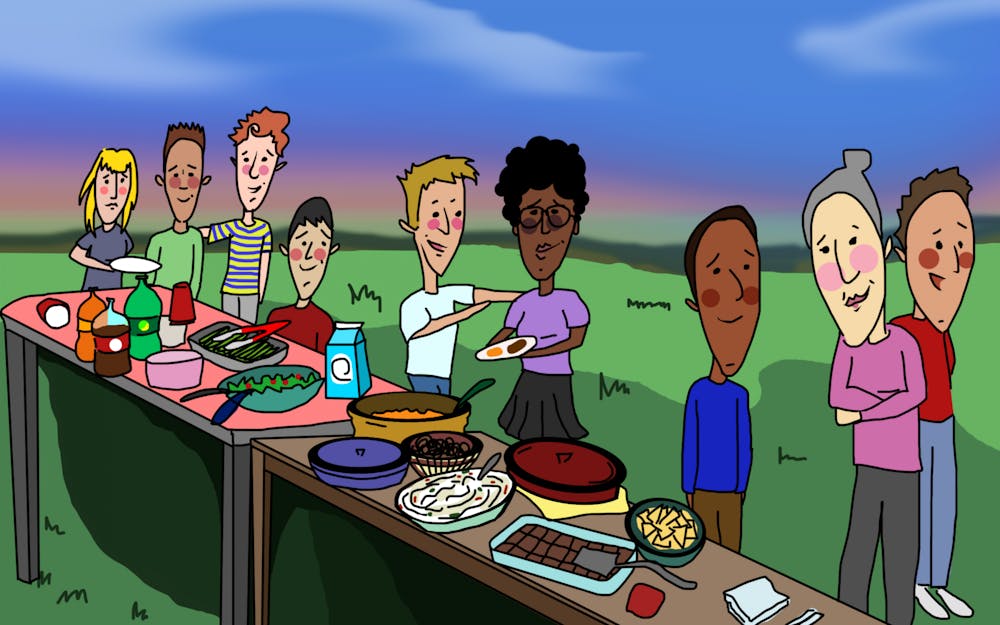I had just made my third trip around a block on Eighth street in New York City. Not wanting to circle it another time, I decided to ask someone for directions. I turned to the first person I saw, and before I could fully get out where I needed to go, they brushed past me and said, “not now.” Two other people also continued walking after I asked.
So I took a guess, headed two blocks north and went on with my day. But I couldn’t help but think about how in most Midwest cities I’d visited, people were more than happy to give directions, especially to those who you can tell are from out of town.
Was I a Midwest-kid-out-of-water floundering in the big city?
Also: OPINION: An open letter against “masc” culture expectations
After visiting many cities across the country, I’ve realized the “Midwest-nice” phenomena is very real and a special blend of politeness, personability and general kindness.
I’m a Midwesterner through and through. My entire life has mostly taken place in three places. I was born in St. Louis, raised in the suburbs of Chicago and am going to school in Bloomington. While each city has its respective cultures, they all draw heavily from Midwestern identities and values.
What exactly are Midwestern values? From my perspective, they’re pretty easily identified. Growing up I was ingrained in a community-centered culture that encouraged people to speak to people kindly, even in the worst of situations. I was pushed to get to know the people around me, make good friends with those people and help them out as frequently as I can. All of this with the expectation that if you put that energy out into the world, you were bound to get it back.
Maybe I’m biased, but these are outstanding messages to be surrounded by.
Social scientists and polls tend to agree with this evaluation of the Midwest-nice phenomenon. A study about regional differences in psychological characteristics among regions of the United States highlighted the Midwest as containing high levels of conscientiousness and openness, the exact opposite of the expressed attitudes I experienced in New York City. It made me realize how specific and special this widespread helpfulness was.
I’m not trying to knock other regions of the country, but the perception that Midwesterners are much nicer permeates into the rest of the country’s view of the region. According to a University of Cambridge study, 1.6 million U.S. citizens surveyed designated the Midwest with the title “Friendly and Conventional Region.” They also labeled the northeast and Texas as “temperamental and uninhibited” while the west coast was considered “relaxed and creative.”
The Midwest-nice phenomena is more than just a self-identified distinction. It’s greatly noticed, characterized and sometimes criticized by others.
Many articles on this topic praise the “facade” of Midwest-nice behavior while criticizing the passive aggressiveness that stems from constantly being cordial. Tara Carr, a small business development director at University of Wisconsin Green Bay, said the Midwest-nice behavior can have a negative effect on a work environment.
“Midwesterners are more likely to avoid speaking to others in a perceived negative way, rather than deal with the issues directly,” Carr said. “This passive aggressive behavior in the workplace can erupt in many ways: consistent negative attitude, being disruptive, blaming others for mistakes, making sarcastic comments.”
Opinion: My brain is tired of writing negative opinions
While I’ve certainly run into my fair share of passive aggressive people in my life, I would hardly say I’ve run into more in the Midwest than I have in any other part of the country. Sure, Midwest-nice values could lead to emotion masking and poor behavior. But more often than not, I’ve seen it come from a place of advocacy and authentic kindness that is often hard to find in other parts of the country.
As I’ve begun eyeing potential places to live after college, I’ve realized how much I will miss the genuine personability that surrounds me in the Midwest. I feel lucky to have been raised in an environment that taught me politeness and kindness, and I hope to bring that special energy out into the world wherever I go.
Chris Sciortino (he/him) is a junior studying theater and public relations. He is involved with the Queer Student Union and College Democrats at IU and spends a considerable amount of time showing people pictures of his dog, Ellie.





